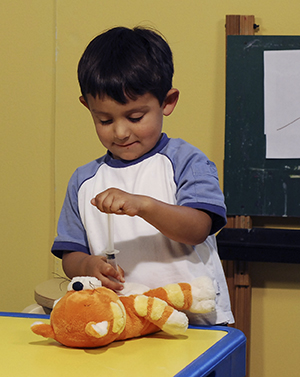Using Play to Help Your Child Cope With Surgery
Children use play to express emotion, learn, and interact. When getting ready for surgery, play can help children understand and cope with their hospital experience.

How can play be used to help your child?
Certain toys and activities can help teach your child about surgery. They can also help distract and relax your child before and after surgery.
What play items are right for your child?
Here are some things that may be helpful, depending on your child's age:
-
Infants use their senses to learn about what’s around them. They can also sense feelings and emotions. Try to stay calm around your child. Bring some toys that your baby likes to the hospital, such as a rattle or a musical toy. These can be used to distract your child. A pacifier may be helpful since your child can’t eat before surgery.
-
Toddlers like to be active. They like to touch and explore things. Toy medical kits can help your child learn about hospital equipment. Bring your child’s favorite toy, such as a stuffed animal, to the hospital. You can also bring puzzles, books, or coloring books. These can help your child relax while waiting to have surgery.
-
Preschoolers have active imaginations. Teach them about surgery with puppets, dolls, picture books, and toy medical kits. Playing a dress-up game with a surgical hat and mask can be helpful. Help your child pick which toys or activities to bring to the hospital. Kids this age like being with other children. Check if your hospital has a play area for children.
-
School-aged children enjoy activities such as reading, writing, and using a computer. Teach them about surgery with age-appropriate books, pictures, or websites. Let your child help pick the toys or activities that they want to bring to the hospital. These might include books, video games, or electronic devices.
-
Teens learn about surgery by asking questions. They also like reading books and researching information online. To cope with surgery, they may want to relax. This may mean talking with their friends, writing in a journal, or listening to music.
Child life specialist
Many hospitals have a child life specialist. This person is specially trained to help children understand and cope with their hospital experience. Families can arrange to see a child life specialist when their child is scheduled for surgery. The child life specialist uses age-appropriate items such as books, dolls, and toy medical or hospital equipment to explain surgery. Parents and siblings are encouraged to attend and be part of these sessions.
Online Medical Reviewer:
Mahammad Juber MD
Online Medical Reviewer:
Raymond Turley Jr PA-C
Date Last Reviewed:
2/1/2025
© 2000-2025 The StayWell Company, LLC. All rights reserved. This information is not intended as a substitute for professional medical care. Always follow your healthcare professional's instructions.